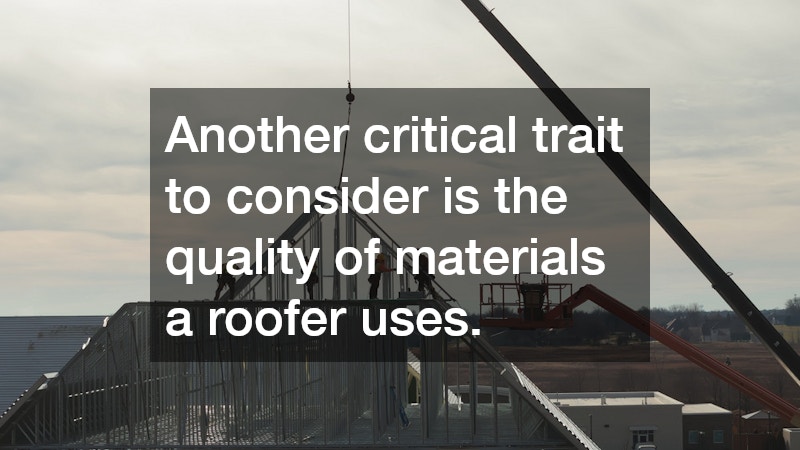When searching for a local roofer, one of the primary traits to look for is experience. Experienced roofers have encountered various roofing challenges and typically possess the know-how to tackle diverse problems effectively. Years in the industry provide a roofer the chance to refine their skills and develop a keen eye for detail. Moreover, roofers with extensive experience bring with them a wealth of knowledge about different roofing materials and installation techniques. It’s essential to inquire about the years of experience a roofing contractor has, as this can greatly affect the quality of roofing installation you’re aiming for.
Video Source
Expertise in the roofing industry means more than just experience; it involves specialized knowledge and skills. Local roofers who possess expertise are often certified by reputable manufacturers or industry organizations. These certifications are a testament to a roofer’s dedication to mastering their craft and staying updated with the latest roofing technologies. Therefore, when evaluating potential roofers, ask about any certifications they hold and the training they’ve completed. This information helps you gauge their professional standing and commitment to providing high-quality services.
In addition to certifications, expertise can be assessed through customer testimonials and references. Satisfied past clients are usually the most reliable indicators of a roofer’s competency and professionalism. Reach out to previous customers or look for reviews online to get a sense of the roofer’s reputation. Happy clients will often highlight the finesse and adeptness displayed during their roofing projects. Therefore, feedback from previous customers can significantly influence your decision on which roofer best suits your needs.
Reputation and Reviews
A good reputation speaks volumes about a roofer’s reliability and quality of service. Reputation is built over time through consistent service delivery and customer satisfaction. Word of mouth remains one of the most powerful forms of recommendation, especially within local communities where service providers rely heavily on repeat business. Hence, during your search for a reliable roofer, pay attention to what locals say about their experiences. Positive feedback from community members is a solid indicator of a trustworthy and skilful roofer.
Another avenue to assess a roofer’s reputation is through online reviews. Platforms like Google, Yelp, and Better Business Bureau offer insights into the roofer’s past work and customer interactions. Reviews can reveal both positive experiences and potential red flags such as unresolved complaints. Reading through detailed reviews allows you to weigh the pros and cons of working with a particular roofer. You also get an idea of how they handle complaints and whether they strive to rectify any issues with their services.
Apart from online reviews, consider contacting the roofer directly for references. A reputable roofer will often have no qualms about providing contact information for previous clients who can vouch for their work. Speaking directly to past clients helps clarify any doubts and gives you a chance to ask specific questions about their roofing installation experiences. Confirm whether the project deadlines were met, budgets adhered to, and any problems dealt with professionally. This firsthand information is invaluable in making an informed decision.
Quality of Materials Used
Another critical trait to consider is the quality of materials a roofer uses. High-quality materials contribute significantly to the longevity and durability of your roof. A roof serves as your home’s primary defense against the elements, and subpar materials can lead to early wear and costly repairs. Ensure the roofer of your choice works with reputable suppliers and can offer options that fit both your budget and long-term roofing needs. It’s always beneficial to discuss material choices and warranties that may accompany them during your initial consultations.
Quality materials also factor into the overall aesthetics of your home. Different homes call for different roofing materials, and a knowledgeable roofer can guide you in choosing what best complements your property’s style. Whether you’re looking for asphalt shingles, metal roofing, or tile, each material offers unique benefits and visual appeal. A roofer who understands this can provide invaluable advice tailored to enhancing not only function but also the beauty of your home. Therefore, understanding material quality is crucial in planning your roofing installation.
Notably, the sourcing of materials is equally significant as their quality. Local roofers who have established relationships with manufacturers can often negotiate better prices or faster delivery, benefiting your project timeline. Ask potential roofers about their suppliers and whether they have partnerships that indicate reliability in material sourcing. Additionally, understanding a roofer’s choice and use of materials reveals their commitment to providing excellent results. Quality materials are an investment in your home’s future, and the right roofer makes wise decisions in this regard.
Licenses and Insurance
Verifying that a roofer is licensed and insured is crucial before entering any agreements. Licensing ensures that the roofer has met the state’s requirements to perform roofing work legally. It’s a baseline standard that protects consumers by ensuring that the contractor has the necessary skills and knowledge. Furthermore, having insurance protects both you and the roofer from potential liabilities during the project. Therefore, always ask to see proof of licensing and insurance before signing on the dotted line.
Insurance is particularly vital because roofing is inherently risky work. Without proper insurance coverage, you could be held financially responsible for any accidents or damage occurring on your property. Worker’s compensation and liability insurance are the two primary types of coverage roofers should have. Reliable roofers openly provide these details and reassure clients by walking them through the coverage specifics. Don’t hesitate to ask questions about how their insurance policies safeguard your interests throughout the project.
Besides demonstrating compliance and professionalism, licenses and insurance reflect a roofer’s business acumen. These elements show that the contractor values legality and ethical practices in their operations. Moreover, a licensed and insured roofer is more likely to adhere to required building codes and safety standards during your roofing installation. This can prevent future legal or safety issues arising from non-compliance. In essence, securing licensed and insured services offers peace of mind, ensuring you’re working with a contractor committed to high standards of safety and legality.



